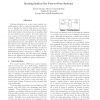Free Online Productivity Tools
i2Speak
i2Symbol
i2OCR
iTex2Img
iWeb2Print
iWeb2Shot
i2Type
iPdf2Split
iPdf2Merge
i2Bopomofo
i2Arabic
i2Style
i2Image
i2PDF
iLatex2Rtf
Sci2ools
ICDCS
2002
IEEE
2002
IEEE
Routing Indices For Peer-to-Peer Systems
Finding information in a peer-to-peer system currently requires either a costly and vulnerable central index, or flooding the network with queries. In this paper we introduce the concept of Routing Indices (RIs), which allow nodes to forward queries to neighbors that are more likely to have answers. If a node cannot answer a query, it forwards the query to a subset of its neighbors, based on its local RI, rather than by selecting neighbors at random or by flooding the network by forwarding the query to all neighbors. We present three RI schemes: the compound, the hop-count, and the exponential routing indices. We evaluate their performance via simulations, and find that RIs can improve performance by one or two orders of magnitude vs. a flooding-based system, and by up to 100% vs. a random forwarding system. We also discuss the tradeoffs between the different RI schemes and highlight the effects of key design variables on system performance.
Distributed And Parallel Computing | ICDCS 2002 | RI Schemes | Routing Indices | Vulnerable Central Index |
Related Content
| Added | 14 Jul 2010 |
| Updated | 14 Jul 2010 |
| Type | Conference |
| Year | 2002 |
| Where | ICDCS |
| Authors | Arturo Crespo, Hector Garcia-Molina |
Comments (0)

